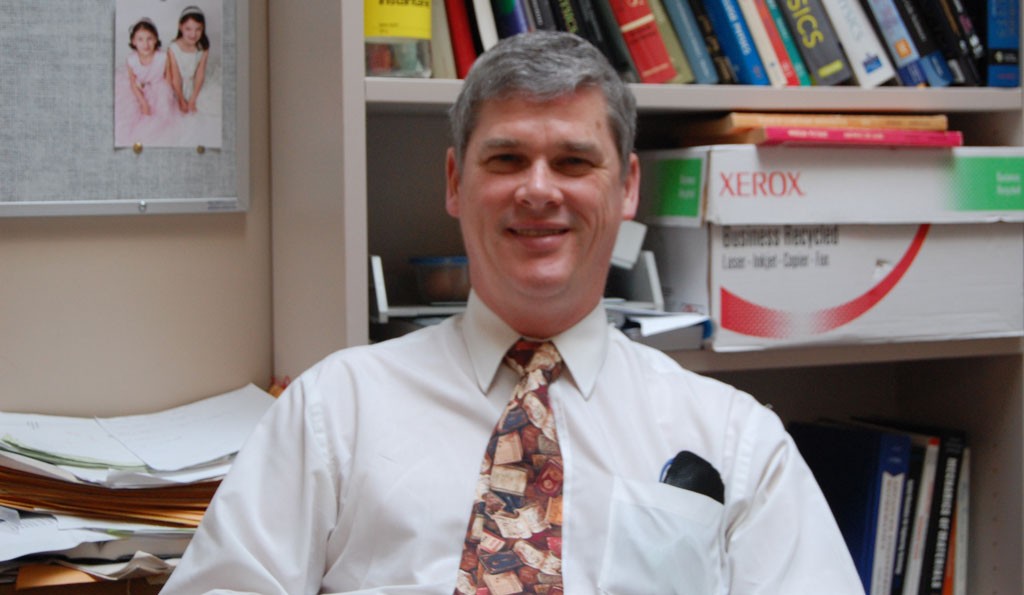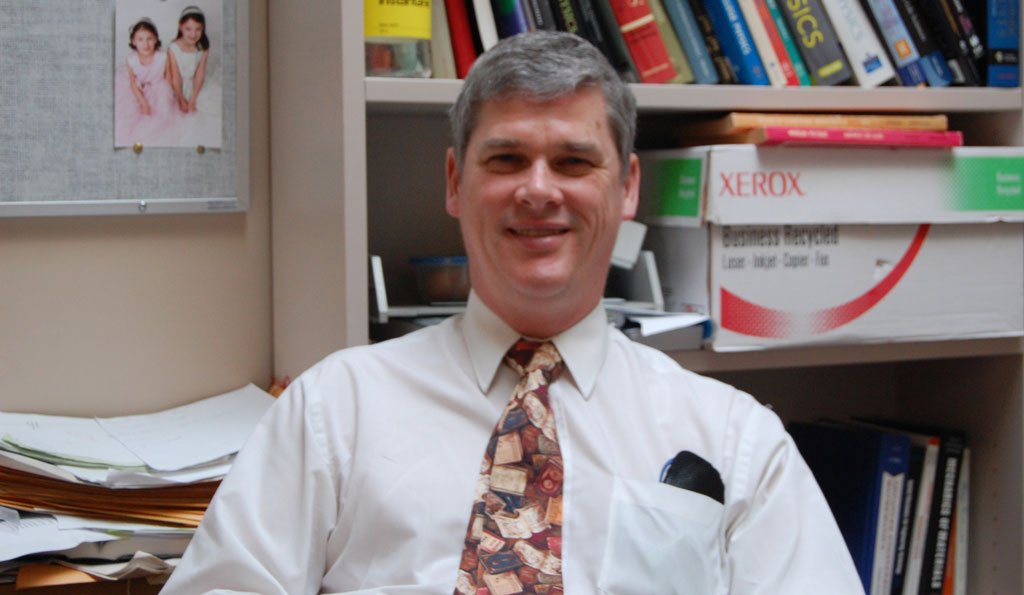By Michael Scoular (The Cascade/Photo) – Email
Print Edition: February 18, 2015

What brought you to UFV?
I was doing the standard route that most people did when they do their PhD, and what happened is all of a sudden we had a downturn in the economy — you can probably identify with that these days — and the number of university research positions just plummeted. Well, I didn’t just enjoy the research, I actually did enjoy the teaching.
At that time, it was considered sort of a second-tier approach. But I thought, “You know? I like this.”
I think I’m better in a position like this than I would’ve been elsewhere, and I came here the same year that we came from Fraser Valley College to the University College, so I spent over 15 years on various committees working on the development of the place, and that was a lot of fun.
What sort of things did you do on the committee?
Probably the single biggest thing I was on was chair of academic standards for the best part of a decade. And back 20 years ago, everything was very much, “We have no idea what we’re doing, let’s just work with a few basic ideas: what’s good for the students?”
Money was actually in the bank, as it were. You have a bunch of students wanting to do astronomy classes? You know, we can find some money for that! And we’d run a class for six people. Which you don’t see happening anymore. But the thing was there was student demand. We figured what they wanted, we put it there.
Were there rules in place for getting people in at that time? No. So we made them up, pretty much on the fly. Makes it sound like a Wild West — it wasn’t quite that bad. There were guidelines, so there was a technique for handling the bulk of the stuff, but the upper levels, which were brand new, we could do pretty much want we wanted, provided we could show it was good for the students. And that was actually a wonderful time.
The relationship between students and professors allowed for those kinds of decisions?
Yeah! With only about a half-dozen students who are always in the same class, we got to know each other very well. You wouldn’t even think, back in the early 1990s, of not taking your entire upper-level class out for a beer after the final exam. It was a fun time.
What did you start teaching when you first came here?
I first arrived doing nothing but physics. Usually a few first-year classes, but mainly the applied upper-level classes: electronics, optics, especially. Most of my work was in experimental physics, so building stuff and making stuff work. And those are important skills for any scientific professional. It’s great to know the theory, and I’m not going to say anything bad about studying the theory. But that’s a huge different thing when you can go into your own home and say, “The lights aren’t right,” and then rewire part of the house as necessary.
That’s actually one of the things I’ve seen. It used to be two-thirds of my students would come in with hands-on experience. It was two out of 36 this term right now.
Is that because of the change in high school learning?
To a large extent. Plus, more students are living in apartments — they don’t have the garage that their parents used to do work in. I started working on woodwork when I was about six, seven years old. That was true for pretty much everyone who is an old fart like me. And I used to do my own car work. Everyone did, because no one could afford to go to a mechanic, so if you’re a grad student, you knew that about one weekend a month, the hood of your car was going to be open, you’re going to be pulling something out to repair it.
Has that changed how you teach now?
I can’t assume as much hands-on experience as I used to, so I’ve gradually taken out a lot of the theory from my lectures in engineering classes and replaced it with, “How does a lathe work?” “What’s a milling machine, and why would you use it?” Things which kids would have come in knowing 20 years ago, they don’t now. So I have to adapt to that.
Would you say there have been any particular colleagues or students that have been helpful or influential in what you do?
Most certainly the answer is yes. I will say right now we used to have some people in our senior admin. Barry Bompas is the name that comes to mind right away. He actually was the head of personnel at the time, but he controlled a lot of the purse strings.
Bill Cooke, the registrar. He was wild. Was the first registrar, retired a few years ago. He had the same attitude. You’d walk up to him and say, “I’ve got students who are faced with this problem.” He’d say, “Sorry, I can’t do a thing because university regulations say this.” You’d wait five seconds. “And here’s how you talk to get those regulations changed.” And we ran this institution, from before the time I arrived, I assume, up until about five, 10 years ago, until we got university status, on, “You give us a good reason for fixing a problem, we’ll make sure it gets fixed.”
There were a few students, particularly in that first cadre, who were very competent at what they did. And if you were willing to sit down over a beer and talk with them, they would tell you what we should expect from other students coming in, and we would modify our classes accordingly. We weren’t doing things the same way as a UBC or a UVic would. We were addressing — kids were coming in from these high schools, they were strong in this, let’s take that one step further. And we’ll make sure they have all the stuff for grad school, we didn’t shortchange them, but we’d give them that extra little bit. For a lot of my senior courses, particularly in electronics, I left the last month of the term open for, “Well what do you want me to cover?” And we would do things that were at times graduate-level electronics, simply because the students had the interest.
What kind of things have you worked on in your own research?
In 1999, one of the very superb instructors we had here, Normand Fortier, left to go to TRU. He was running our engineering transfer program. I was the next-most qualified person, so it ended up in my lap. And for the last, almost 15 years, that has become a raison d’être for me, because this is where I can make a difference. I have spent time at major institutions, spent time in local industry, asking, “What do you need, if you wanted to hire one of our students over the summer?” And I’ll find out what they’re looking for or what they don’t care about, and all my first-year engineering classes are now based around these bits of feedback. They still follow the original curriculum in principle, but definitely they are very hands-on, applied, here-is-what-you-need-to-know-if-you-want-a-job-style courses.
You mentioned the possibility of becoming too insulated — what kind of relationship is there between the physics department and the sciences and other areas of the university?
It’s healthy. There was an old joke at UBC: if you looked at the way the windows opened, they came up like the door on the cannons in the old pirate movies, and it was because we were always firing back and forth at each other. That is not true here. It is certainly true that I have friends in many departments, not just in the sciences. And that is very useful for keeping the boundaries down as much as possible. I will spend time in the office of the current chemistry department head, usually talking about movies and stuff like that. It builds up rapport, and all of a sudden he’ll say, “I need X” — he knows to talk to me, he knows my specialty, and we’ll work back and forth.
You mentioned there’s a lot of things students don’t have anymore, is there anything the newer generation of students has that surprises you?
Their ability to interact with other students is better than it used to be. I don’t want to make this sound worse than it is, but there was a lot of intolerance between students of people that were different in any way, shape, or form. And I’m not talking about racism particularly: “You went to a different school than I did.” That was enough to exclude people from groups 20 years ago. “I was taught this, you were taught something different, I’m not going to interact with you.” That was amazingly common back then — it wouldn’t be the majority of students, but it was common enough I had to address it. That’s not an issue right now, and that’s a big improvement. The social maturity of students has improved greatly over the year.
This interview has been edited for length and clarity.


